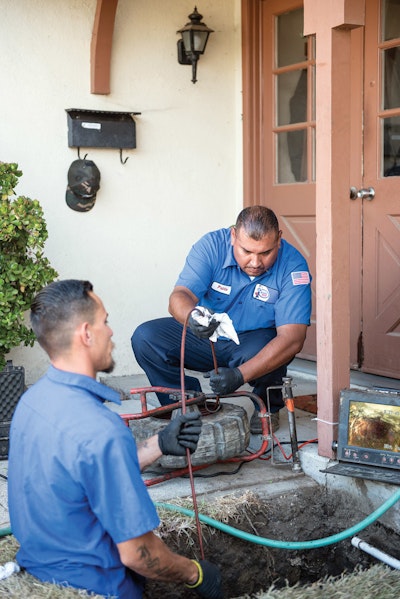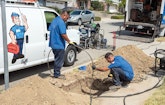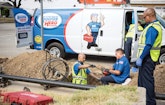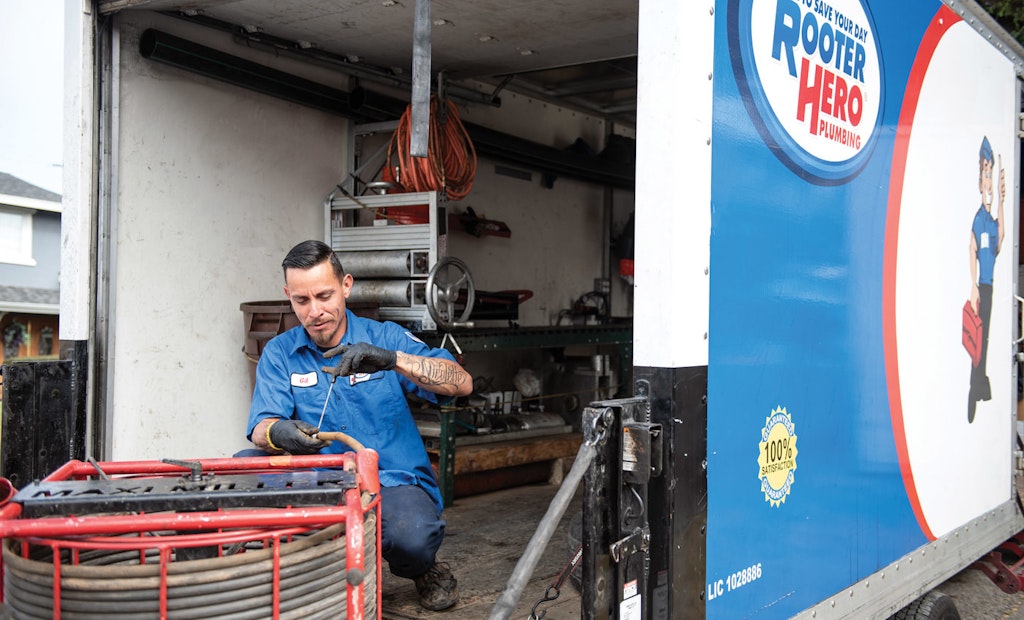Interested in Plumbing?
Get Plumbing articles, news and videos right in your inbox! Sign up now.
Plumbing + Get AlertsJohn Akhoian is a hero to his employees.
What else would you call a business owner who has made a commitment to enrich his employees and provide them with the tools to excel in and out of the workplace?
Akhoian is wildly ambitious, but he’s not interested in politics or becoming a corporate tycoon. His goal is not to increase his personal wealth on the backs of his employees, but instead to aid in their success.
His fittingly named drain cleaning and plumbing company, Rooter Hero Plumbing, has expanded to 12 locations in seven years. He hopes to reach 100 offices in the next decade. Another initiative to encourage his employees is his “99 Millionaires” concept, the idea being to create 99 millionaires under the company’s umbrella.
It’s not all about making the big bucks, though — the company also offers financial literacy training for any employee.
“I want to help our people as much as I can, educate our people so when they do come to work, they can come to work with peace of mind and give our customers the service they deserve. We want to help the people who are working with and in our companies to create wealth for their families,” Akhoian says. “If we can help them solve their personal problems, then we feel our customers will get a better service. And plus, it’s the right thing to do.”
Building the company
As with any hero’s journey, it was humble beginnings for Rooter Hero, which opened its doors in 2011 with a single truck servicing the Orange County, California, area. Today, the company stretches as far as Phoenix, with 250 trucks.
Akhoian himself has a pretty noble origin story, starting out as a plumbing apprentice at the age of 17 to support his family after the death of his father.
“My dad was the breadwinner of the family, and I quickly knew that I didn’t have time to go to school. I had to get out and be productive right away,” he says. A family friend was a plumber, and he went to work for him as an apprentice. “I quickly learned the trade, and I took a liking to it — within about a year, I was out doing all of the plumbing myself; he wouldn’t even go out in the field anymore.”
Within a year he was earning enough to start thinking about growth.
“I had a conversation with him because I really wanted to grow and he didn’t want to grow his company. So he said, ‘John, your options are: you could go work for a big company, you could stay and work here or go start your own thing,’” Akhoian says. “At that time, I decided I’m going to start my own thing.”
He started his entrepreneurial career with a small commercial plumbing company but quickly saw that investing in a franchise was the fastest way to grow and learn the ins and outs of the industry.
“That’s kind of how it all started, when I was about 19 years old,” he says. “Over the next two to four years, I built a really good company. I was doing mainly apartment building repipes, and I was doing large commercial jobs. I had a few vans and was making really good money. One day I saved enough money and I wanted to buy a franchise.”
He rapidly expanded, in the end owning pretty much all the available franchises in the area.
“I had multiple locations, so I understood the model of operating in multiple markets,” Akhoian says. “I understood the model of having a strong management team in place, having a good training program in place and having a really good operating system.”
At a certain point, he decided to leave the franchise because he felt he had reached his peak with that avenue.
“I wanted to continue growing, and the franchise had already sold all of its locations. I really didn’t have much more opportunity; I didn’t feel like if I renewed my agreement another 10 years that we would have the opportunity to grow for the next 10 years,” Akhoian says. “I felt like we were eventually going to hit a plateau, which we did. So we sold all of our franchises.”
That experience has benefitted him as he now seeks to build his own company. Though it isn’t technically a franchise, it is organized much like one, with independent management structures at each location, though they are all run through the company’s corporate office in Mission Hills, California.
Most important to stimulating this type of expansive growth is getting the right people and putting them in the right position to succeed. That’s especially true of the location managers.
“They’re built of different kinds of people. Some of them used to be plumbers and ended up becoming a location manager — they understand how to operate. Some of them used to be salespeople. Some of them used to work for another company as a manager and they just couldn’t grow any further. So they’re all different,” Akhoian says. “I would say half of them are internal promotions, and the other half come from the outside.”
Proper incentives are also important: Rooter Hero again mimics the franchise model by giving high-level employees in the company an opportunity to become part owners.
“We give people who are running our locations a chance to own a piece of that location, and the program works through increasing revenue, increasing profits,” Akhoian says. “As it increases, they earn a piece of that location, and it becomes almost like phantom stock that will turn into real stock over time.”
Hero University
In addition to personal improvement, Akhoian is a firm believer in ongoing professional development.
Recruits undergo a rigorous training program that was developed internally, and every manager in the company goes through a management training program — they even have an emerging leaders program to identify promising talent and promote them within the organization.
“What’s helped us grow so fast is our ability to train people. It’s really difficult to find experienced plumbers anymore, so we hit a wall. We eventually ended up creating our own plumbers,” Akhoian says. “In the beginning, we were just taking anybody who was mechanically inclined, young, motivated and who wanted to get into the trades. Over time, we started losing some people because they realized they didn’t really want to do it.”
In its early days, the training program had limited hands-on elements, and when recruits started having to crawl under buildings or get their hands dirty, some had second thoughts.
“We started to tweak and change our program, and now 80% of the people who are going through our Hero University program have signed on as apprentices. They’ve done ride-alongs, and they’ve done the labor,” Akhoian says. “We started to see much less turnover, because now they’re more committed. They’ve already tried it, they’ve done the work and they know what to expect.
“In about nine to 12 weeks, we’re able to certify and put them out in the field as drain cleaning technicians,” he says. “They do light plumbing repairs and all of that stuff as well. While they’re doing it, we continue to train them on how to become even better at what they do, because they end up coming across a lot of different plumbing problems when they’re on the job.”
Rooter Hero is a residential service and repair company, with about 70% of its business in drain cleaning and 30% in plumbing. To support those services, Hero University is paid training with two days of fieldwork and three days of classroom or mock-up training. The company has a mobile training unit with all of the fixtures and equipment that technicians would use on the job.
“They learn code, they learn theory and then they learn how to actually take it apart and put it back together. They learn how to operate sewer machines and how to fix sewer machines when they’re in the field,” Akhoian says.
Depending on the location, Rooter Hero techs use Gorlitz Sewer & Drain and Spartan Tool drain cleaning machines; jetters from US Jetting, Harben and HotJet USA; RIDGID inspection equipment; Perma-Liner Industries systems for relining; a TRIC Tools pipe bursting system; and MaxLiner USA epoxy.
“Besides Hero University, which goes through the technical training for technicians, we have a communication training that we put everybody through,” Akhoian says. “Every month, we have a two-day training that happens for technicians and salespeople called T.N.T.; and then we put them through a boot camp where we go through the five keys of service.”
The five keys of service is another internally developed program to train technicians on the customer service side of their job. The keys are diagnose, ask, listen, educate and W.A.W. (way above wonderful).
Salespeople are also taught to leave six options with every customer to solve his or her problem. Akhoian believes in giving customers the information to make an educated decision, not upselling them on something they don’t need. Part of the training includes a role-playing element where technicians and salespeople practice the method in a live environment.
Management training is a two-year program, and they spend one whole day per month on leadership education.
“We feel like when we get better, everything around us gets better. If we can train and become better at what we do, then our customers will be better taken care of,” Akhoian says. “Everything is going back into training and reinvesting in the company — for growth, for learning, for marketing, for branding.”
Catalyst for success
Another training offered by the company is not directly related to drain cleaning or plumbing, but Akhoian still believes it has benefits for the company — personal finance education.
“We teach our people how to read financial statements — all of that stuff. And in our company, we do open-book management, which means that every single employee knows exactly what our numbers are; so every single number is gone through with all of our employees,” Akhoian says. “We do profit sharing, so they know what our company’s profit margin is.”
Rooter Hero isn’t the only company out there that does companywide profit sharing, but they take it a step further by not only giving employees a fair shake, but also by ensuring they have the tools they need to benefit from the boost in a meaningful way.
It feeds into his philosophy that happy employees equal happy customers, and a stronger business.
“You have to invest back into the business. We treat the business like a person and never take advantage of the business,” he says. “Most people will use the business to fuel their lifestyle. We take the business, we live within our means and then we put money right back into our business. We put it right back into our people; we put it right back into investing in the trade.”
There’s no doubt that the industry has been good to Akhoian, and his hope is simply to spread that success as far and wide as he can.
“I’ve been doing this for 30 years. I’ve been a plumber by trade, and I just really, really love the plumbing industry,” Akhoian says. “I feel like this has been my calling, and I get to show up to work every day and do what God put me on Earth to do.”
Creating millionaires
It should be no surprise that John Akhoian has done very well for himself, building a small drain cleaning and plumbing empire from scratch after selling a powerhouse franchising arm.
And with his determination to empower his employees as they grow through the company, it’s also not surprising to hear that there are a few financial success stories under the auspices of Rooter Hero Plumbing.
“Within the last seven or eight years of our company growing, a handful of people have become millionaires in the process — either earning more money, or spending less money and investing more, and doing other things,” Akhoian says.
But that’s not enough for him. He wants to create 99 millionaires throughout the company’s infrastructure as he seeks to build up to 100 locations over the next decade.
“We want to make 10 times the impact that we’ve made,” he says. “So we’re offering profit sharing. Some of our people running our locations also own parts of the location, and they’re creating wealth through the company growing.”
It isn’t just a recruiting pitch, either. Akhoian actually wrote a book about the passion project, titled Creating 99 Millionaires, which is available for free as an e-book on the Rooter Hero website.
“We’re making a really big impact,” he says. “And it’s my personal goal to create 99 millionaires.”










